

Τέχνηo. Literary Theory and Schools of Criticism. Summary: This resource will help you begin the process of understanding literary theory and schools of criticism and how they are used in the academy.
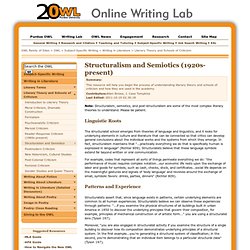
Contributors:Allen Brizee, J. Case TompkinsLast Edited: 2011-10-19 02:30:18 Note: Structuralism, semiotics, and post-structuralism are some of the most complex literary theories to understand. Please be patient. Linguistic Roots The structuralist school emerges from theories of language and linguistics, and it looks for underlying elements in culture and literature that can be connected so that critics can develop general conclusions about the individual works and the systems from which they emerge.
Patterns and Experience Structuralists assert that, since language exists in patterns, certain underlying elements are common to all human experiences. Structuralism in Literary Theory Peirce and Saussure Two important theorists form the framework (hah) of structuralism: Charles Sanders Peirce and Ferdinand de Saussure. Sign Systems Typical questions: How to choose a thesis topic. One of the most common questions I get asked is how to choose a thesis topic.
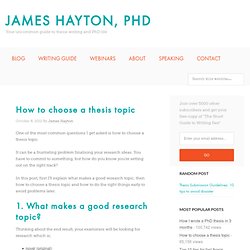
It can be a frustrating problem finalising your research ideas. You have to commit to something, but how do you know you’re setting out on the right track? In this post, first I’ll explain what makes a good research topic, then how to choose a thesis topic and how to do the right things early to avoid problems later. Thinking about the end result, your examiners will be looking for research which is; novel (original)set in the context of the existing research in the field, andcompetently executed When choosing a thesis topic, it makes sense to use these criteria to help you.
Novelty It’s incredibly hard to come up with a completely new idea. 25 Things You Should Know About Storytelling. 1.
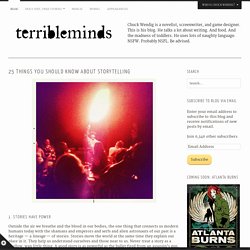
Stories Have Power Outside the air we breathe and the blood in our bodies, the one thing that connects us modern humans today with the shamans and emperors and serfs and alien astronauts of our past is a heritage — a lineage — of stories. Stories move the world at the same time they explain our place in it. They help us understand ourselves and those near to us. Never treat a story as a shallow, wan little thing. 25 Things Every Writer Should Know. An alternate title for this post might be, “Things I Think About Writing,” which is to say, these are random snidbits (snippets + tidbits) of beliefs I hold about what it takes to be a writer.

I hesitate to say that any of this is exactly Zen (oh how often we as a culture misuse the term “Zen” — like, “Whoa, that tapestry is so cool, it’s really Zen“), but it certainly favors a sharper, shorter style than the blathering wordsplosions I tend to rely on in my day-to-day writing posts. Anyway. Peruse these. Absorb them into your body. Let your colonic flora digest them and feed them through your bloodstream to the little goblin-man that pilots you. Amy K. Nichols: Five Things I Learned Writing Now That You’re Here. One minute Danny was running from the cops, and the next, he jolted awake in an unfamiliar body—his own, but different.
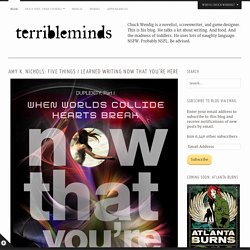
Somehow, he’s crossed into a parallel universe. Now his friends are his enemies, his parents are long dead, and studious Eevee is not the mysterious femme fatale he once kissed back home. Then again, this Eevee—a girl who’d rather land an internship at NASA than a date to the prom—may be his only hope of getting home. Eevee tells herself she’s only helping him in the name of quantum physics, but there’s something undeniably fascinating about this boy from another dimension . . . a boy who makes her question who she is, and who she might be in another place and time.
I used to do contract work in writing, graphic design, web design, you-name-it, and again and again I ran into this quandary: should I count the time I spend thinking about a project as billable hours? It’s the same when it comes to writing stories. Os pobos. Τέχνιχ. Τέχνη. Plume. EDUCATION. Writing Research Questions. .pdf version of this page This review is a collection of views and advice on composing research questions from problem statements.
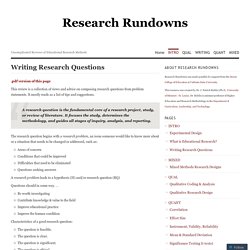
It mostly reads as a list of tips and suggestions. A research question is the fundamental core of a research project, study, or review of literature. It focuses the study, determines the methodology, and guides all stages of inquiry, analysis, and reporting. The research question begins with a research problem, an issue someone would like to know more about or a situation that needs to be changed or addressed, such as:
Writing a Research Report. .pdf version of this page This review covers the basic elements of a research report.
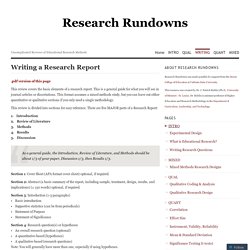
This is a general guide for what you will see in journal articles or dissertations. This format assumes a mixed methods study, but you can leave out either quantitative or qualitative sections if you only used a single methodology. This review is divided into sections for easy reference. DATA. Data Sorta. Mekne. Research Nodes. Life & GTD. Ways Places Means. Reference. Information. Essayer. New Info Reference.